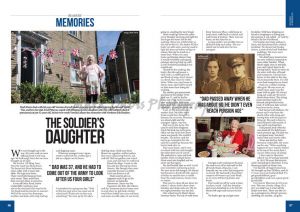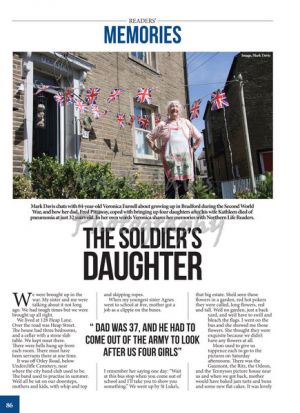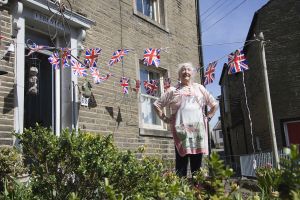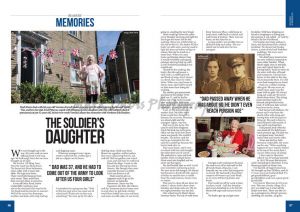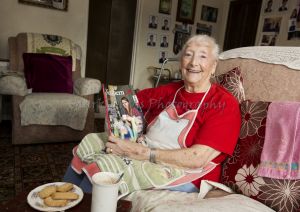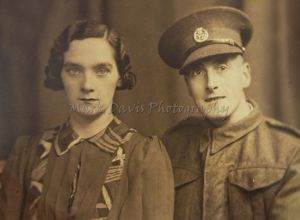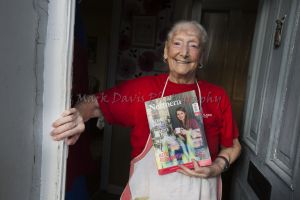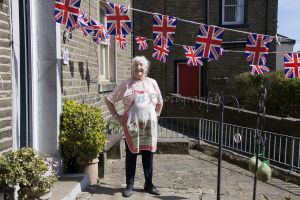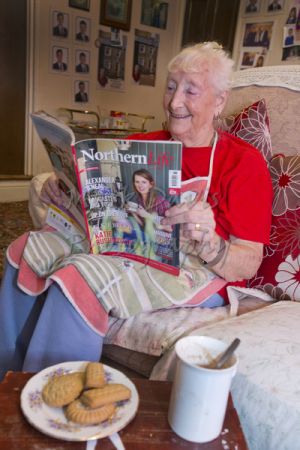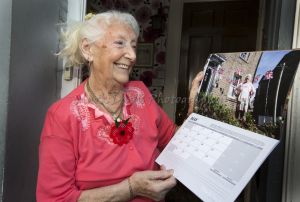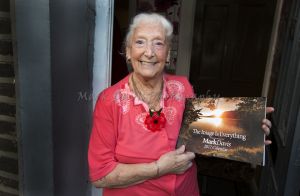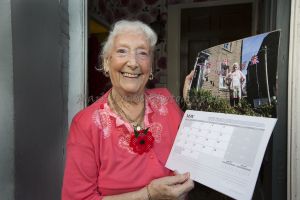Veronica Farnell – Market Street Thornton
With Northern Life Magazine – April 2017
Mark Davis chats with 84-year-old Veronica Farnell about growing up in Bradford during the Second World War, and how her dad, Fred Pittaway, coped with bringing up four daughters after his wife Kathleen died of pneumonia at just 32 years old. In her own words Veronica shares her memories with Northern Life Readers.
We were brought up in the war. My sister and me were talking about it not long ago. We had tough times but we were brought up all right.
DAD WAS 37, AND HE HAD TO COME OUT OF THE ARMY TO LOOK AFTER US FOUR GIRLS
We lived at 128 Heap Lane. Over the road was Heap Street. The house had three bedrooms, and a cellar with a stone slab table. We kept meat there. There were bells hung up from each room. There must have been servants there at one time.
It was off Otley Road, below Undercliffe Cemetery, near where the city band club used to be. The band used to practise in summer. We’d all be sat on our doorsteps, mothers and kids, with whip and top and skipping ropes.
When my youngest sister Agnes went to school at five, mother got a job as a clippie on the buses. I remember her saying one day: “Wait at this bus stop when you come out of school and I’ll take you to show you something.” We went up by St Luke’s, that big estate. She’d seen these flowers in a garden, red hot pokers they were called, long flowers, red and tall. We’d no garden, just a back yard, and we’d have to swill and bleach the flags. I went on the bus and she showed me those flowers. She thought they were exquisite because we didn’t have any flowers at all.

Mum used to give us tuppence each to go to the pictures on Saturday afternoons. There was the Gaumont, the Ritz, the Odeon, and the Tennyson picture house near us and when we got back, mother would have baked jam tarts and buns and some new flat cakes. It was lovely going in, smelling the new bread. Mum would go down the cellar every Monday morning and light the fire to get the water hot for the washing. There was a little boiler at the side of the fire. She had to fill this boiler up with water, and she used to light the stove up before we’d go to school. She had to stand on a stone floor. When we came home on Monday dinner time it would be bubble and squeak, potatoes and veg fried up, with a cold Yorkshire pudding if you wanted one.
There’d be the washing, the boiler, the tub and posser, a table with a scrubbing brush and block of soap, starch mixed in a bowl, blue rinse for white shirts. When we came home at dinner time, she’d still be stood on that stone floor doing the washing.
My mother got pneumonia and died in November 1943. Dad was 37, and he had to come out of the Army to look after us four girls. He had to work, and there was no family allowance, no free meals or owt.
I was 11 the day before my mother died. My elder sister Freda would have been 13 in January, the next one, Maureen, was about eight and the youngest, Agnes, was five.
Dad was in the Army. We used to send him telegrams. Uncle Sid took me to the post office one day to let him know mum was poorly. She couldn’t breathe. The doctor said she had to go in hospital but she said she couldn’t go because she had to look after us.
Dad came home, and I went to school with him and brought the other three out of school. The ambulance came and took mother when we all got home. Mum went into hospital and we never saw her again.
My dad looked after us well. I can’t ever remember not having a meal. We were never left hungry. We always had biscuits to finish off with, and on a Friday we used to have a vanilla from the confectioners. Sweets were on ration.
Dad used to clean all our shoes for school. I always had to have clean knickers and clean socks on. Oh, he was right particular, was my dad.
Our school was St Mary’s down German Street. We had to walk there from Tennyson Place, walk home at lunch time, walk back to school, and walk home at teatime. There were no buses, no bus fares for us. Losing mother was terrible, but we all had to help each other. The two oldest had to look after the two youngest.
Dad got a job working on the post. He used to set off at 4am and he did all Leeds Road, a big area. I can honestly say, we never had margarine on bread. My dad used to buy butter coupons off women up Leeds Road, so we were still having butter and bread.

Dad would set off for work at 4am, six days a week – half day Saturday – and never disturbed us as he left. He always left cups and saucers out for us.
We had to get up and get some breakfast. We’d have dripping on bread or dripping in a frying pan – dip and pan it was called – or we’d fry bread in fat for fried bread.
On Sunday mornings we’d go to Mass, and dad always did a cooked breakfast. We always had Sunday dinner, a joint of beef and Yorkshire puddings. We never went without food.
We didn’t have luxuries but we were well fed compared to some other families. When there’s eight, nine or ten kids, you can’t expect them to be having butter. You’d see them in the street with slice of bread and margarine. I always have butter on the table to this day. It’s permanently there. I’ve still never had margarine on bread.
Dad was a soldier looking after girls. He was never an untidy man, and it was the same with us girls. We always hung our coats up. We never threw them down. The sitting room furniture had to be cleaned and polished every week. If we’d been lads we’d all have been in the Army.
DAD PASSED AWAY WHEN HE WAS ABOUT 60. HE DIDN’T EVEN REACH PENSION AGE
Dad started with diabetes. He always said it was from the shock of his wife dying and leaving him with four girls to bring up. He used to have to inject himself with insulin. It was awful watching him.
Dad passed away when he was about 60. He didn’t even reach pension age. My dad was a real good man. You don’t realise that until you’re older.
Mum and dad are both buried at Undercliffe. My mum used to say: “When anything happens to me I want to buried at the top of the street then I can see what you’re all doing.”
I first came to Thornton when I was 19 and got married in 1952. I’d never had electric until I moved up to Thornton. It was always gas lights at Heap Lane.
I’ve had lots of happy times here. We brought up four children, and it’s 17 years since my husband died. I’ve got grandchildren, greatgrandchildren and even a great-greatgrandchild.
I’ve been in Thornton for 65 years now. This was a lovely village. It’s a pity you didn’t see it when all the shops were here. There was the Coop, a greengrocers, Driver’s grocers, anything you needed… all gone.
